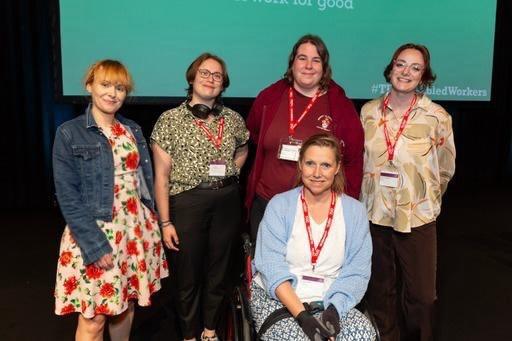At the conference, held in Bournemouth and in person for the first time since 2019, CSP delegates raised issues around the continued failures brought upon disabled people, backed proper funding for reasonable adjustments and the need to ensure inclusivity for young disabled people entering the workforce.
Seven in ten disabled employees earn less than £15 an hour, and in the Northeast and Wales, that figure rises to nine in ten, CSP delegates to the TUC Disabled Workers Conference also heard this week.

CSP members Greet Janssens, children’s physiotherapist and chair of the CSP DisAbility Network; Jasmine Churms, band 5 rotational physiotherapist and co-opted member of the TUC Disabled Workers Committee; and Iona Bateman, 2nd year BSc physiotherapy student at the University of Southampton, attended conference alongside CSP staff members Scarlett Chamberlain, diversity engagement officer and Siân Caulfield, national officer (equality and diversity).
Young workers
In her speech supporting the call for reasonable adjustments for young disabled workers, Jasmine Churms said, ‘young disabled people are our future. As disabled people, we face barriers throughout our lives. These barriers can make work extremely challenging or in the worst-case scenario, feel we are left with no choice but to leave an employer.’
She continued, ‘Young disabled people entering the workforce are learning to navigate the working environment, using access to work, negotiating reasonable adjustments, and advocating for ourselves at work, while trying to avoid burnout and attempting to achieve a work-life balance. There is great potential for innovations in universal design and environmental additions that would benefit not just young disabled workers but many others.’
Three further speeches were delivered by CSP delegates, including Greet Janssens’ speech in support of the CSP motion – supported by UNISON and passed unanimously – alongside Iona Batemans’ speech supporting a Royal College of Midwives motion on the need for proper funding for reasonable adjustments in the NHS workforce.
Greet brought a part of her own lived experience to demonstrate the need for the impact report which the CSP asks for in our motion. 'The need to stop painting a negative image of disabled people in the press was a recurring theme throughout the conference,' she added. 'Looking at the conference attendees was so uplifting as each had a story of resilience to tell.'
Closure of rail ticket offices
An emergency motion was brought to conference by the Bakers Food and Allied Workers Union, in support of the national union of Rail and Maritime Transport workers, who are opposing plans by the Government and train companies to close nearly one thousand ticket offices across the rail network.
CSP national officer, Siân Caulfield said, ‘ticket offices and station staffing need to be protected. We know that the closure of ticketing offices will be felt acutely among disabled people, elderly passengers and those requiring additional support. Furthermore, station ticket machines are often not accessible for disabled people, adding more stress to their journey and relying on being able to track down a staff member if they need assistance.’
Oppose these ticket office closures? Sign and share the petitionand write to your MP.
Closing note of thanks
Iona Bateman was asked to deliver closing remarks, thanking conference for their contributions and engagement over the past two days. In her final speech, Iona talked about her experience of engaging with the CSP, the positive impact this has had on her and her ability to advocate for other disabled people.
If you are a Disabled member of the CSP, you can attend the TUC Disabled Workers Conference, held annually. Get in touch with Siân Caulfield to find out more.
Find Out More
Number of subscribers: 2